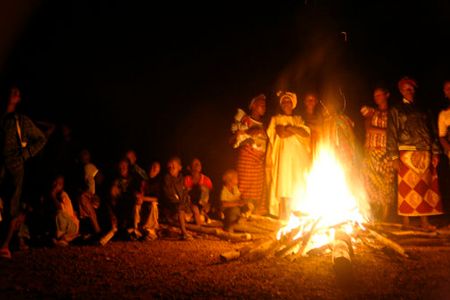Africa Center Explores Sierra Leone Civil War
 By the light of a campfire, the young woman speaks quickly. She describes a scene of almost unimaginable horror; herself at age 12, raped by 15 men, including her own uncle.
By the light of a campfire, the young woman speaks quickly. She describes a scene of almost unimaginable horror; herself at age 12, raped by 15 men, including her own uncle.
“I see this man all the time,” the woman, identified as Esther, says. “I want to show him to you.”
From the crowd behind her, the woman draws forth a man – her uncle Joseph. He begs her forgiveness, saying he was forced into the act. She forgives him. In the firelight, they begin to dance.
This is a scene from “Fambul Tok,” a prize-winning documentary about the healing and reconciliation process after the devastating civil war in Sierra Leone.
In cinema, forgiveness and the healing of wounds can happen before a director stops the camera. In life, though, the story is more complicated. At the African Studies Center at the Frederick S. Pardee School of Global Studies at Boston University, Tufts professor Rosalind Shaw delved deeply into the case of Mabonkani, a village in Sierra Leone with a difficult trek toward reconciliation.
“The phrase ‘Fambul Tok’ means “family talk,” said Shaw, who presented the talk, “In the Town Where Youth Ruled their Fathers: Reimagining Reconciliation in a Postwar Sierra Leonean Community” as part of the Walter Rodney Seminar Series. She showed the scene with Esther and Joseph before beginning her remarks. “It is based on the tradition of resolving issues within the security of the family circle. Fambul Tok works with communities and builds on local practices.”
However, some have critiqued Fambul Tok as being an invented paradigm. Additionally, the traditional family practices Fambul Tok builds on have their roots in the social milieu that contributed to the civil war.
“There were generational dimensions of Sierra Leone’s civil war,” Shaw said. “The abolition of slavery in Sierra Leone in 1928 led to a patriarchal, gerontocratic social order that left young people subject to the authority of their elders.”
This social order, coupled with a downturn in the Sierra Leonean economy and few opportunities for education, catalyzed into a process Shaw termed ‘disembedding:” when young people are drawn out of old cultural practices and into new practices and identities.
This is exactly what happened in Mabonkani, where the young people in the village were conscripted into rebel factions and then given authority over the elders in their own village – people to whom they had traditionally been subjugated.
“The young people had been doing most of the work on family farms. Now they were responsible for getting the quotas of goods demanded by the juntas,” Shaw said. “Some of the combatants embraced their new roles, taking on bush names and committing acts of violence. Others tried to reintegrate with their families. But most were suspended in the middle.”
After the war ended in 2001, Mabonkani held its own Fambul Tok-type event, a reconciliation day in a local church. Combatants repented their actions and said they had been coerced, and all present pledged themselves to have ‘cool hearts’ and abjure further violence.
Nonetheless, all did not return to normal in Mabonkani.
“Today, families in the village are eating imported rice. Young men are more interested in working their own plots of land than helping on family farms,” Shaw said. “The young people in the village have extricated themselves from control of their elders, but with disastrous results for food security. If reconciliation in Mabonkani is an experiment, it is an experiment that is not over.”
Recordings of the Walter Rodney Seminar Series are available at Boston University’s iTunes U Library.